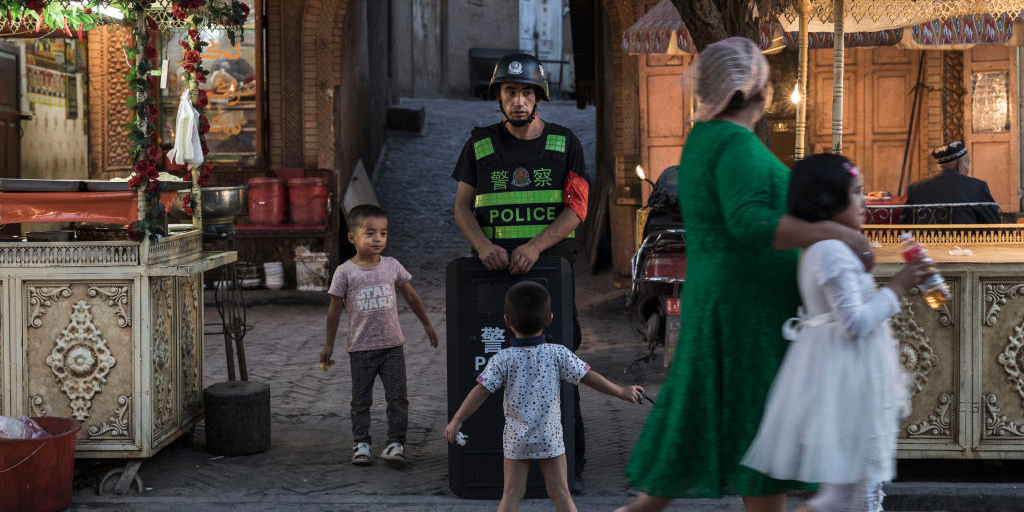- China has imprisoned at least 1 million Uighur Muslims in prison-like detention camps in the western Xinjiang region, according to numerous activists and researchers.
- Shohrat Zakir, the governor of Xinjiang, claimed without evidence on Monday that everyone in the camps, which China euphemistically calls “vocational training centers” is now out.
- Zakir said everyone had now “graduated” from the facilities, where reports of psychological and physical torture are common.
- He said all previous detainees now have stable employment and are leading happy lives.
- Visit Business Insider’s homepage for more stories.
Chinese authorities claimed Monday to have released all Uighur Muslims from the country’s oppressive prison camps in Xinjiang, contradicting widespread reports that at least 1 million are locked up in its vast system.
Shohrat Zakir, the Uighur governor of the western Chinese region of Xinjiang, told a Monday press conference that people in those camps are all out and living happy, fulfilled lives, the Associated Press (AP) reported.
Zakir offered no evidence to support his claim. He referred to the camps as “vocational training centers” – a euphemism often used by Chinese officials to describe the prison-like camps.
Many of the Uighurs detained in those centers are white-collar professionals, and do not need vocational training, many relatives say.

Multiple activists and researchers have in recent months published satellite images appearing to show China expanding the prison-camp network, seeming to contradict any suggest that everyone would be suddenly released.
Most estimates say there are at least 1 million people locked up inside.
Zakir said everyone in those centers had "completed their courses," according to Agence France-Presse (AFP)
Uighurs abroad say they still cannot get in touch with their vanished relatives, and it is almost impossible to speak to anyone physically in the region. Authorities in Xinjiang consider it a crime to communicate with people outside.
Many Uighur exiles say they have been blocked by their family on social media and messaging apps.

China has for years carried out a coordinated surveillance and detention campaign on the Uighurs and other Muslim minority groups in the region, which it characterizes as a counterterrorism measure.
The Chinese Communist Party sees their religion as a threat, and often refers to Islam as a gateway to extremism or a disease.
Former detainees have told of being physically and psychologically tortured inside - a stark contrast to Chinese claims that they were learning vocational skills. Researchers also say some inmates are subjected to forced labor.

The party's tactics against the Uighurs were starkly revealed in a series of internal government documents that were leaked to The New York Times and the International Consortium of Investigative Journalists (ICIJ) last month.
The ICIJ documents showed that Chinese authorities strictly control detention camps, which include double-locking dorm rooms to prevent escapes during bedtime, toilet breaks, or meals.
On Saturday, a Uighur Dutch woman named Asiye Abdulaheb revealed herself as having helped disseminate the ICIJ documents.

'The US feels uneasy'
Zakir on Monday also attacked recent legislation by US lawmakers, which mandates the White House to condemn and punish Chinese authorities behind the Uighur crackdown. The bill is now being passed back to the Senate.
"When the lives of people of all ethnic groups in Xinjiang were seriously threatened by terrorism, the US turned a deaf ear," Zakir said, according ot the AP.
"On the contrary, now that Xinjiang society is steadily developing and people of all ethnicities are living and working in peace, the US feels uneasy, and attacks and smears Xinjiang."
"But no force can stop Xinjiang's progress toward stability and development," he added, according to Reuters.

Zakir's talking points mirrored those by other Chinese officials, who have repeatedly brushed off The Times and the ICIJ's reports on the leaked documents as fabrications and attempts by foreign media to "smear" successful counterterrorism efforts in Xinjiang.
In August Zakir claimed, again without evidence, that more than 90% of "graduates" from the camps had "found satisfactory jobs with good incomes."
This spurred Uighurs abroad to launch a social media campaign, under the hashtag #Provethe90%, to demand proof that their missing relatives and friends had returned home. China did not respond to that campaign.
- Read more:
- Mysterious automated calls, vanished relatives, and sinister Facebook comments: How China intimidates Uighurs who don't even live in the country
- A Uighur Dutch woman admitted to leaking secret Chinese cables on Muslim oppression. She's going public to stop China's death threats.
- Devastating leaks have deprived China of its main strategy to deflect mounting evidence of its mass oppression of Uighur Muslims
- Congress just kicked Trump's trade deal in the teeth for all the right reasons

